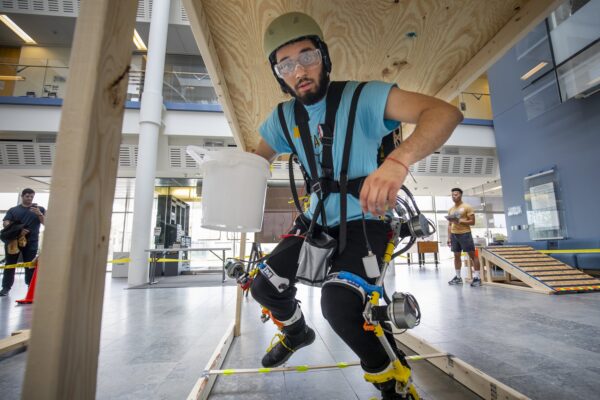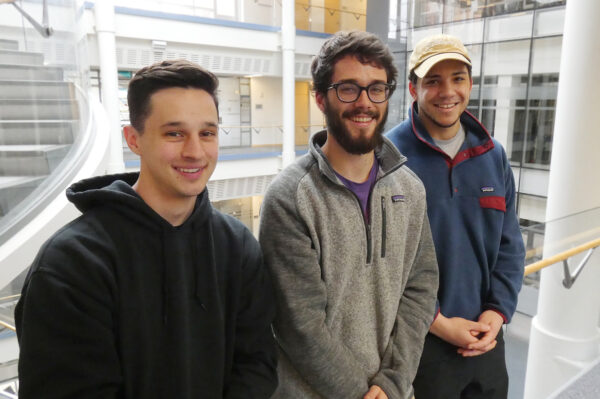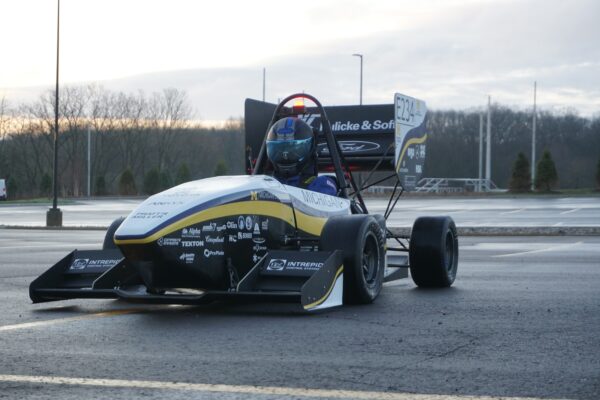Experts from the University of Michigan College of Engineering share some of the major advancements in tech that occurred in 2019 and what we can watch for in 2020.
Pilotless flight
Somewhere, in a parallel universe, there is an Ella Atkins who happily does her research on autonomy in aerial vehicles, licenses software to aircraft companies and generally makes airspace a safer place.
5G
Channel Coding for Next Generation 5G and Beyond
With the help of two NSF awards totaling $1.7m, Prof. Hessam Mahdavifar is tackling new problems to improve the reliability of communication systems for 5G and beyond.
Fighting viruses
Cold plasma can kill 99.9% of airborne viruses, U-M study shows
Dangerous airborne viruses are rendered harmless on-the-fly when exposed to energetic, charged fragments of air molecules, University of Michigan researchers have shown.

Professor Herek Clack and members of his team set up a lab-scale non-thermal plasma device. Image credit: Robert Coelius/Michigan Engineering
Election security
Halderman recommends actions to ensure integrity of US systems
In congressional testimony, U-M professor urges $370M in federal funding to replace outdated machines.
Space
Beyond Apollo 11: U-M ECE’s role in advancing space exploration
For the 50th anniversary of the Apollo 11 moon landing, U-M ECE took a look back – and a look forward – to how our professors, students, and alums have made their mark on the field.
Augmented reality
Student team brings augmented reality to the operating room
With the help of a VR headset, three students helped a doctor stay focused in the operating room.
Carbon sequestering
Climate change: Why removing CO2 from the air isn’t enough
Switching to large scale renewable resources is the only way to curb extreme carbon capture costs.
Drug development
How an AI solution can design new tuberculosis drug regimens
A new method could replace trial and error drug development.
Artificial intelligence
Michigan team competes in Amazon challenge to make AI more engaging
The team of twelve students is one of ten worldwide working to give Amazon’s Alexa more human-like conversational skills.

Group photo of the team’s twelve members and two advisors, rightmost on couch Profs. Nikola Banovic and David Jurgens.
Drones
Using swarms of drones to map and help fight wildfires
To monitor and stop the spread of wildfires, University of Michigan engineers developed UAVs that could find, map and report fires.
Machine learning
Enabling large-scale testing of cancer drugs with machine learning
Prof. Euisik Yoon and his team developed a new machine learning tool that enables large-scale testing of cancer drug effectiveness with microfluidics.
Exoskeleton
Michigan takes first place at Exoskeleton Competition
Michigan took first place at this year’s Applied Collegiate Exoskeleton (ACE) competition held in Ann Arbor. While there are many uses for exoskeletons, or robotic suits, the ACE competition evaluates suits that are designed to serve first responders.

CE Undergraduate Gurpreet Singh Kalsi undergoes the fourth obstacle test at the 2019 Applied Collegiate Exoskeleton Competition.
Deep-fakes
Computer vision: Finding the best teaching frame in a video for fake video fightback
The frame in which a human marks out the boundaries of an object makes a huge difference in how well AI software can identify that object through the rest of the video.
Resource management
Counting snowflakes for better water resource management
Mostafa Zaky has built an award-winning model that helps estimate the amount of water stored in snowpacks, which could improve climate change and flood forecasting, as well as overall water resource management.
Microelectronics
Advancing microelectronics and systems for the security of the future
Dr. Jeremy Muldavin returned to campus as an ECE Distinguished Lecturer to speak about the Department of Defense’s Microelectronics Innovation for National Security & Economic Competitiveness initiative and related advanced secured electronics foundry challenges.
Privacy and encryption
How Let’s Encrypt doubled the percentage of secure websites in four years
The percentage of websites protected with HTTPS secure encryption has jumped from just over 40% in 2016 to 80% today. That’s largely due to the efforts of Let’s Encrypt, a non-profit certificate authority co-founded in 2013 by University of Michigan professor J. Alex Halderman.
Quantum computing
The new quantum spurs action by the Michigan Quantum Science & Technology Working Group
The new working group showcased Michigan’s strength in Quantum Science at a workshop attended by researchers throughout the University of Michigan.
Electronic racing
Michigan Electric Racing Revs Up
MHybrid– a multidisciplinary, student-run organization – was founded in 2011 with the mission to design, build, test, and finance their own high-performance, hybrid-electric Formula-style race car. This year, they rebranded as Michigan Electric Racing (MER) and competed against teams from all over the world.
Predictive movement
Teaching self-driving cars to predict pedestrian movement
By zeroing in on humans’ gait, body symmetry and foot placement, University of Michigan researchers are teaching self-driving cars to recognize and predict pedestrian movements with greater precision than current technologies.
Internet censorship
New tool combats evolving internet censorship methods
Technology pioneered by Michigan researchers has made a promising advance toward widespread adoption.






